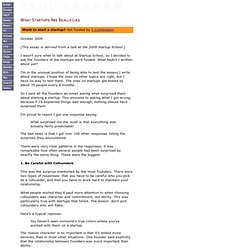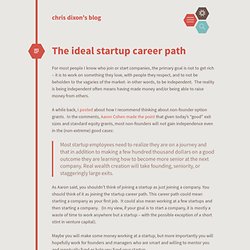

What Startups Are Really Like. October 2009 (This essay is derived from a talk at the 2009 Startup School.)

I wasn't sure what to talk about at Startup School, so I decided to ask the founders of the startups we'd funded. What hadn't I written about yet? I'm in the unusual position of being able to test the essays I write about startups. I hope the ones on other topics are right, but I have no way to test them. So I sent all the founders an email asking what surprised them about starting a startup. I'm proud to report I got one response saying: What surprised me the most is that everything was actually fairly predictable! The bad news is that I got over 100 other responses listing the surprises they encountered. There were very clear patterns in the responses; it was remarkable how often several people had been surprised by exactly the same thing. 1. This was the surprise mentioned by the most founders. What people wished they'd paid more attention to when choosing cofounders was character and commitment, not ability. 2. You Weren't Meant to Have a Boss.
March 2008, rev.

June 2008 Technology tends to separate normal from natural. Our bodies weren't designed to eat the foods that people in rich countries eat, or to get so little exercise. There may be a similar problem with the way we work: a normal job may be as bad for us intellectually as white flour or sugar is for us physically. I began to suspect this after spending several years working with startup founders. Though they're statistically abnormal, startup founders seem to be working in a way that's more natural for humans. I was in Africa last year and saw a lot of animals in the wild that I'd only seen in zoos before. Trees What's so unnatural about working for a big company?
Another thing you notice when you see animals in the wild is that each species thrives in groups of a certain size. Whatever the upper limit is, we are clearly not meant to work in groups of several hundred. These smaller groups are always arranged in a tree structure. Corn Syrup. Is it Time for You to Earn or to Learn? This is part of my Startup Advice series I often have career discussions with entrepreneurs – both young and more mature – whether they should join company “X” or not.

I usually pull the old trick of answering a question with a question. My reply is usually, “is it time for you to earn or to learn?” Let’s face it. If you’re thinking about joining as the director of marketing, product management manager, senior architect, international business development lead, etc. at a startup that has already raised $5 million the chances of you making your retirement money on that company is EXTREMELY small. Yet I often hear people asking about these types of opportunities express their questions to me whether I think this company is going to be a big hit. And let’s say that it took 4 years to exit – that’s $31,250 / year. So let’s go CRAZY! Don’t get me wrong. I’m not trying to depress you. For most people it’s learn. So a friend recently called to ask for advice on becoming the CTO of a startup. Career Planning : Where to go and why. The ideal startup career path. For most people I know who join or start companies, the primary goal is not to get rich – it is to work on something they love, with people they respect, and to not be beholden to the vagaries of the market- in other words, to be independent.

The reality is being independent often means having made money and/or being able to raise money from others. A while back, I posted about how I recommend thinking about non-founder option grants. In the comments, Aaron Cohen made the point that given today’s “good” exit sizes and standard equity grants, most non-founders will not gain independence even in the (non-extreme) good cases: Most startup employees need to realize they are on a journey and that in addition to making a few hundred thousand dollars on a good outcome they are learning how to become more senior at the next company. Real wealth creation will take founding, seniority, or staggeringly large exits. As Aaron said, you shouldn’t think of joining a startup as just joining a company.